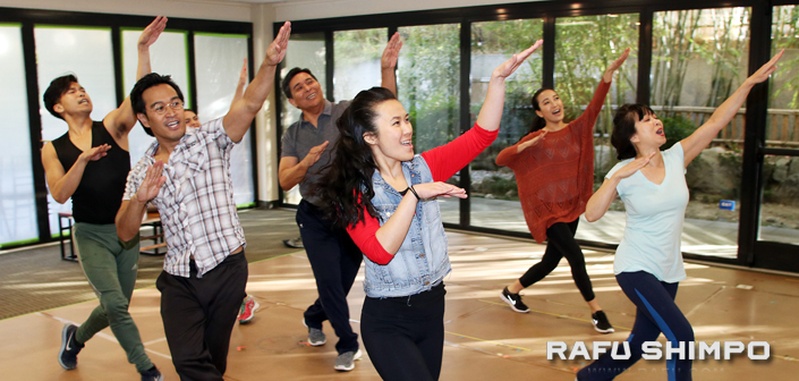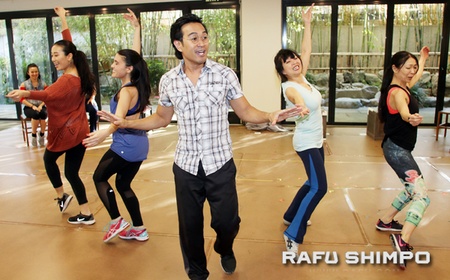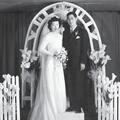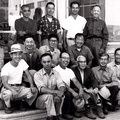With rehearsals in full swing, the cast of the Los Angeles production of Allegiance met with local media on Feb. 8 at the Japanese American Cultural and Community Center.
Directed by Snehal Desai, producing artistic director of East West Players, the musical will begin previews on Feb. 21 and officially open on Feb. 28 at JACCC’s Aratani Theatre, 244 S. San Pedro St. in Little Tokyo.
The cast of 15, which includes five from the Broadway show, performed four numbers — “Paradise,” “Gaman,” “Higher,” and “Our Time Now” — which reflect the struggles and conflicts that Japanese Americans went through during their World War II incarceration as well as their determination to survive.
Inspired by the childhood experiences of actor/activist George Takei, the show has a book by Jay Kuo, Marc Acito and Lorenzo Thione with music and lyrics by Kuo. It focuses on the Kimura family — siblings Kei and Sammy, their father Tatsuo and their grandfather, Ojii-chan. When the government imposes a loyalty questionnaire, Sammy decides to enlist in the Army while Kei sides with the resisters.
“It’s a different production,” said Takei, who reprises his roles as Ojii-chan and present-day Sam Kimura. “We have five members of the Broadway cast here, but the others are all new people. That is another new kind of excitement, new chemistry, new relationships. We have a new director, a new choreographer, Rumi Oyama.
“She’s turning in wonderful work … very dynamic, lively. There’s a lot of Japanese touches. She can choreograph very masculinely, the martial arts stances that she works in, as well as the classic Japanese movements, as well as contemporary dance movements … New ideas, new ways of doing things, so it’s very exciting. It’s a different experience altogether.”
While he has shared his story as the only cast member who was in camp, Takei said he has learned a lot from his co-stars. “They bring with them fascinating personal histories too … Sammy is being played by Ethan Le Phong. He is a boat person. He was born in Vietnam and when he was 3 years old his extended family of 17 fled on a small boat and they bobbed around the South China Sea until they landed in Thailand. They were in a refugee camp for a long time, then this philanthropist in Chicago flew the immediate family to Chicago, and that’s how he got to this country. So here he is now, a very accomplished singer, dancer, and actor playing the male lead in the show.
“The other male lead, the role of Frankie, is being played by a Filipino American who was born and raised in Maryland and got his college training at Carnegie Mellon, a very fine theater school there … Elena Wang [who plays Kei] is a Singaporean who grew up in Perth, Australia. So quite varied Asian ethnic groups come together to do this.”
Regarding changes in his performance, Takei said he is cutting back on the dance numbers. “I’ve aged three more years since Broadway and I’m beginning to sense the years are sapping my energy reserve … I used to run marathons and I used to be very athletic. I still maintain myself, but no cartwheels.”
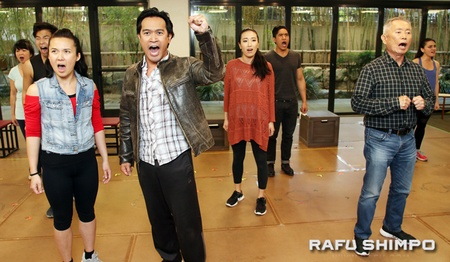
The New Kei and Sammy
As Lea Salonga’s understudy on Broadway, Wang studied “how did she pull this particular character off” and had the opportunity to perform as Kei for a total of about two weeks. And because many of the Broadway cast members had done the workshop versions of the play and the Old Globe production in San Diego, “they already had beautiful chemistry, so it was interesting to just watch, to actually be there in the room.”
Wang said of the L.A. production, “This is so different from the Broadway show. The fact that it’s a new cast — a new Sammy, a new Frankie, the choreography is a little different, the staging is a little different.”
“More than half of the cast is brand new, so we’re injecting a lot of new creativity and a new angle of seeing the show again,” Phong added.
“The chemistry is brand new … We have a new brother-sister relationship. It’s very young, it’s very vibrant,” Wang said. “ … The relationship on Broadway between the brother and sister is more mature. Now we’re kind of more playful and it brings out a lot of nuances within the show as well.”
“I’ve known of the show since the workshop days because Telly [Leung, who played Sammy] was always telling me about it, but I caught a preview of it about two years ago,” Phong said. “ … I remember seeing it. I was like, ‘Oh, I would like to play that.’”
“We’re very lucky to have George in the production, to actually relay things he’s actually been through in his real life,” Wang said. “It’s so amazing to have that as a resource, and of course George is just an amazing person.”
Asked if there were elements of the story that he could relate to, Phong responded, “Oh yes, I think being the first-born Vietnamese, wanting to make sure I make my dad proud all the time. The Asian boys always try to make sure that we live up to Dad’s expectations.”
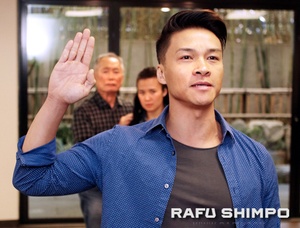
Wang answered, “There’s a lot — falling in love as a girl, finding freedom, finding myself, and interestingly enough, I was finding myself during the Broadway production, finding that self-worth. That’s what Kei does as well.”
Eymard Cabling, who plays draft resister Frankie Suzuki, Kei’s love interest, is new to the show. “I have followed the show from its out-of-town try-out in San Diego before it went to Broadway,” he said. “So it was in San Diego back in 2012, and then maybe four or five years later it went to Broadway. I saw it … three times in New York, and then I saw the Fathom Events special [the Broadway show on the big screen]… But this is my first production, which I auditioned for in the summer of 2017 …
“Michael K. Lee, who originated the role, is a great reference point. I’ve read previous inceptions of the drafts of the script and I have been following the role of Frankie and the whole show in its entirety, so I’m familiar with it enough, but I’m learning new things with this new cast and this new energy and new director.”
Cabling, whose stage credits include “Thoroughly Modern Millie,” “The King and I” and “Miss Saigon,” described Allegiance as “another beautiful piece of Asian American theater that we can add to the repertoire of musical theater, and as a musical theater performer, as an actor, it is wonderful to see work that is passionate, creative and empowering … It lifts up my spirit knowing that there are opportunities for future productions and opportunities for actors to stretch themselves and to tell true stories and tell historical accounts instead of the funny … stereotypical Asian role.”
Portrayal of Masaoka
Greg Watanabe, who is reprising his role as JACL leader Mike Masaoka, said that bringing the show to L.A.’s Japanese American community is very significant. “Folks who didn’t get a chance to come out to New York are going to have a chance to see it. My dad grew up in Boyle Heights … The Watanabes, they went to Heart Mountain. So this means a lot to me. You know our families will be able to come out and see that.”
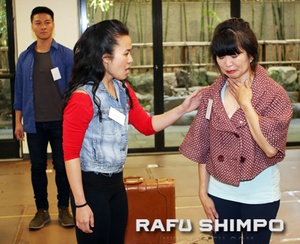
Given the current political situation in the country, Watanabe said, “It’s a super important story to tell right now. It’s always been relevant, but now it’s like we’re watching history repeat itself as we speak. So I really hope people see this. We feel a strong affinity that they’ll come out and stand with Muslim communities and Arab communities and stand up for immigrants. Because I think that’s ultimately what the lesson is — that we have to show solidarity with these groups that are being demonized because if we don’t, nobody will …
“I feel like every generation has a time in which there is some fear-mongering demagogue who steps up and he starts blaming somebody else for economic woes or whatever. So there’s always going to be somebody who’s going to get blamed, some other community that’s going to suffer the abrogation of civil liberties, and that’s where we stand up.”
Although the L.A. production does not have a Broadway-sized budget, Watanabe said, “Essentially it’s a story of a family, even though it’s something that happened to our entire community. I think that it does have intimacy … I think that the designers are doing an amazing job and I think the video [projections] will be beautiful and moving and stirring.”
He also praised Oyama’s choreography. “I think that it’s great because it’s a mixture of Western dance with fields of Japanese traditional movement, so that couldn’t be a greater expression of Japanese American culture … especially the Issei and the Nisei, and I think that people really appreciate that.”
Unlike the San Diego production, Masaoka — the only historical figure in the play — is a non-singing character and is not portrayed as a villain. Many of Watanabe’s lines about the JACL’s support of the loyalty questionnaire are taken from Masaoka’s own speeches.
“It’s a musical, so it’s not perfectly historically accurate, it’s art,” Watanabe explained. “But there are very many, many things in this play that can be directly tied to things that historically happened … It’s a pretty balanced portrayal overall … We’ve got the resisters in there and the No-Nos, the 442, and Masaoka and the wartime JACL … I feel like this musical goes a long way towards being a pretty broad and general encapsulation of the incarceration experience.”
Different Dances
Oyama, who played Mrs. Tanaka in the Broadway show, said of her choreography, “It’s totally different from the Broadway version … Space is smaller and sets are totally different, the dancers are different, so I had to change everything.”
She learned about 1940s dance styles by watching YouTube videos and consulting with a friend in L.A. who is a swing dancer.
Born in Hiroshima and raised in Kanagawa, Oyama has lived in the U.S. for 11 years. “I love America because in Japan everything is so pressured,” she said. “I have a BA in law because … they expect you to be lawyers or doctors, that’s the best job in Japan. Probably here too, but a lot more pressure in Japan and I had to study a lot when I just wanted to be a dancer and singer. For me it’s so much easier to live here and do what I want to do.”
She first learned about the camps when she auditioned for the show. “I had no idea there was this kind of history … I really couldn’t believe at first. It really happened. I’m still learning and I’m still looking at those pictures, tons and tons of pictures. It’s devastating.”
Noting that the filmed version of Allegiance has been shown in Japan, Oyama said, “A couple of my friends went to see the movie and it was very moving … I hope we can bring this musical to Japan — the live version.”
The principal cast also includes Scott Watanabe as Tatsuo Kimura, Janelle Dote as Hanako, and Natalie Holt MacDonald as Hannah Campbell.
Performances run from Wednesday to Sunday, with 8 p.m. shows from Wednesday to Saturday, and 2 p.m. matinees on Saturday and Sunday. Opening night is Wednesday, Feb. 28, at 8 p.m. The production runs until April 1. For tickets and information, visit http://AllegianceMusical.com.
*This article was originally published by the Rafu Shimpo on February 16, 2018.
© 2018 The Rafu Shimpo / J.K. Yamamoto


